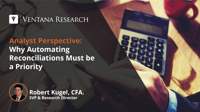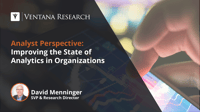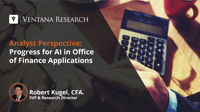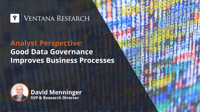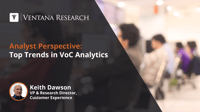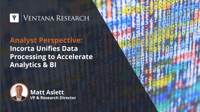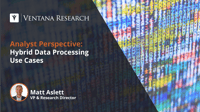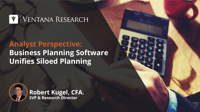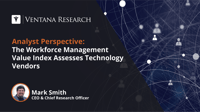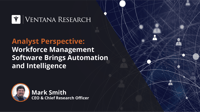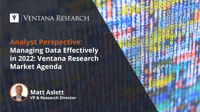There is much vendor activity and customer interest in making better use of data, to improve the sales process in the face of increased pressure to achieve organization revenue goals. As detailed in my Analyst Perspective: The Art and Science of Sales from the “Inside Out," enhanced buyer research as well as the inclusion of more people in the buying process, have made selling harder, evidenced by a general trend of declining quota attainment. There is no denying that better use of data can...
Read More
Topics:
Sales,
Revenue Management,
Sales Engagement,
Revenue Performance Management
Reconciling accounts at the end of a period is one of those mundane finance department tasks that are ripe for automation. Reconciliation is the process of comparing account data (at the balance or item level) that exists either in two accounting systems or in an accounting system and somewhere else (such as in a spreadsheet or on paper). The purpose of the reconciling process is to identify things that do not match (as they must in double-entry bookkeeping systems) and then assess the nature...
Read More
Topics:
Office of Finance,
automation,
Reconciliation
Despite all the advances organizations have made with respect to analytics, our most recent research shows the majority of the workforce in the majority of organizations are not using analytics and business intelligence (BI). Less than one-quarter (23%) report that one-half or more of their workforce is using analytics and BI. This is a problem. It means organizations are not enabling their workforce to perform at peak efficiency and effectiveness. It means the workforce in many organizations...
Read More
Topics:
Sales,
business intelligence,
embedded analytics,
Analytics,
Data,
Sales Performance Management,
Digital Technology,
Digital Commerce,
natural language processing,
Subscription Management,
partner management,
Revenue Management,
Sales Engagement,
Collaborative & Conversational Computing
Contact centers have always been very cost-centric and attuned to the kinds of constraints that they have to operate in, but many organizations were diverted from that kind of focus when the pandemic first hit. In 2020, there was a sudden need for new tools and equipment just to keep centers running, and the costs involved in enabling agents to work from home — equipping them and their supervisors with the tools they needed to collaborate and stay in sync — were unavoidable.
Read More
Topics:
Customer Experience,
Voice of the Customer,
Contact Center,
agent management,
Customer Experience Management,
Field Service,
customer service and support
I recently described the emergence of hydroanalytic data platforms, outlining how the processes involved in generating energy from a lake or reservoir were analogous to those required to generate intelligence from a data lake. I explained how structured data processing and analytics acceleration capabilities are the equivalent of turbines, generators and transformers in a hydroelectric power station. While these capabilities are more typically associated with data warehousing, they are now...
Read More
Topics:
Analytics,
Data Governance,
Data,
Digital Technology,
data lakes,
data operations,
AI & Machine Learning,
data platforms,
Streaming Data & Events
The use of artificial intelligence (AI) using machine learning (ML) will be the single most important trend in business software this decade because it can multiply the investment value of such applications and provide vendors an important source of differentiation to achieve a competitive advantage in what are today very mature software categories. I assert that by 2025, almost all Office of Finance software vendors will have incorporated some AI capabilities to reduce workloads and improve...
Read More
Topics:
Office of Finance,
embedded analytics,
Data Management,
Business Planning,
Financial Performance Management,
ERP and Continuous Accounting,
digital finance,
AI & Machine Learning
Many organizations invest in data governance out of concern over misuse of data or potential data breaches. These are important considerations and valid aspects of data governance programs. However, good data governance also has positive impacts on organizations. For example, I have previously written about the valuable connection between the use of data catalogs and satisfaction with an organization’s data lake. Our most recent Analytics and Data Benchmark Research demonstrates some of the...
Read More
Topics:
embedded analytics,
Analytics,
Data Governance,
Data,
Digital Technology
A formal Voice of the Customer (VoC) program is a necessity for any organization that wants to grow its customer base and differentiate from its competitors. Unfortunately, many organizations have not updated their notion of “formal” in quite a few years.
Read More
Topics:
Customer Experience,
Marketing,
Voice of the Customer,
Contact Center,
Digital Marketing,
agent management,
Customer Experience Management,
Field Service,
Conversational Marketing,
customer service and support
As I stated when joining Ventana Research, the socioeconomic impacts of the pandemic and its aftereffects have highlighted more than ever the differences between organizations that can turn data into insights and are agile enough to act upon it and those that are incapable of seeing or responding to the need for change. Data-driven organizations stand to gain competitive advantage, responding faster to worker and customer demands for more innovative, data-rich applications and personalized...
Read More
Topics:
Analytics,
Business Intelligence,
Data Integration,
Data,
data lakes,
data operations,
AI & Machine Learning,
data platforms,
Streaming Data & Events
Revenue performance management and the role of revenue operations is moving to the forefront of sales organizations, aligning departments around a single view of the business with shared revenue targets and goals. This facilitates the needs of the sales department as well as customer experience, marketing and renewals. The concept of RevOps does not yet have a widely shared common definition within organizations. Because revenue organizations include workers associated with sales operations,...
Read More
Topics:
Sales,
Customer Experience,
Marketing,
Sales Performance Management,
partner management,
Revenue Management,
Sales Engagement,
Revenue Performance Management
I am happy to share insights gleaned from our latest Value Index research, an assessment of how well vendors’ offerings meet buyers’ requirements. The Ventana Research Value Index: Business Planning 2022 is the distillation of a year of market and product research. Drawing on our Benchmark Research, we apply a structured methodology built on evaluation categories that reflect real-world criteria incorporated in a request for proposal to business planning vendors supporting the spectrum of...
Read More
Topics:
Office of Finance,
Business Planning
I recently described how the data platforms landscape will remain divided between analytic and operational workloads for the foreseeable future. Analytic data platforms are designed to store, manage, process and analyze data, enabling organizations to maximize data to operate with greater efficiency, while operational data platforms are designed to store, manage and process data to support worker-, customer- and partner-facing operational applications. At the same time, however, we see...
Read More
Topics:
embedded analytics,
Analytics,
Business Intelligence,
Data,
Digital Technology,
AI & Machine Learning,
data platforms,
Analytics & Data,
Streaming Data & Events
Having just completed the 2022 Ventana Research Value Index for Business Planning, I want to share some of my observations about the business planning software market and how it has advanced as an important part of our market coverage for almost two decades. Dedicated applications for planning and budgeting have been around since the 1980s and are, therefore, quite mature, with robust features and functionality as well as continual refinements in usability and performance. Outwardly, the...
Read More
Topics:
Planning,
Office of Finance,
Budgeting,
Business Planning
Organizations of all sizes are dealing with exponentially increasing data volume and data sources, which creates challenges such as siloed information, increased technical complexities across various systems and slow reporting of important business metrics. Migrating to the cloud does not solve the problems associated with performing analytics and business intelligence on data stored in disparate systems. Also, the computing power needed to process large volumes of data consists of clusters of...
Read More
Topics:
Analytics,
Business Intelligence,
Data Integration,
Data,
data lakes,
data operations,
Streaming Analytics,
AI & Machine Learning
Ventana Research recently announced its 2022 Market Agenda for the Office of Finance, continuing the guidance we have offered since 2003 on the practical use of technology for the finance and accounting department. Our insights and best practices aim to enable organizations to operate with agility and resiliency, improving performance and delivering greater value as a strategic partner.
Read More
Topics:
Office of Finance,
Business Intelligence,
Collaboration,
Business Planning,
Financial Performance Management,
ERP and Continuous Accounting,
Revenue,
blockchain,
robotic finance,
Predictive Planning,
lease and tax accounting,
AI & Machine Learning,
profitability management
Ventana Research recently announced its 2022 Market Agenda for the Office of Revenue, continuing the guidance we have offered for nearly two decades to help organizations realize optimal value from applying technology to improve business outcomes. Chief sales and revenue officers and their associated operations teams are experts in their respective fields but may not have the guidance needed to employ technology effectively. As we look to 2022, we are focusing on the entire selling and buying...
Read More
Topics:
Sales,
Analytics,
Internet of Things,
Data,
Sales Performance Management,
Digital Technology,
Digital Commerce,
Conversational Computing,
mobile computing,
Subscription Management,
extended reality,
intelligent sales,
partner management,
Sales Engagement,
AI & Machine Learning
I am happy to share insights gleaned from our latest Value Index research, an assessment of how well vendors’ offerings meet buyers’ requirements. The Ventana Research Value Index: Workforce Management 2022 is the distillation of a year of market and product research by Ventana Research. Drawing on our Benchmark Research, we apply a structured methodology built on evaluation categories that reflect the real-world criteria incorporated in a request for proposal to workforce management vendors...
Read More
Topics:
Human Capital Management,
Learning Management,
Talent Management,
Workforce Management,
Payroll Management,
Total Compensation Management,
employee experience
Ventana Research recently announced its 2022 Market Agenda in the expertise area of Marketing, continuing the guidance we have offered for nearly two decades to help organizations derive optimal value from business technology and improve outcomes.
Read More
Topics:
Marketing,
Marketing Performance Management,
Product Information Management,
Digital Marketing,
intelligent marketing,
Digital Experience Platform,
Conversational Marketing
Workforce management processes and activities, a major focus of investment and optimization efforts for decades, have undergone a huge transformation in recent years. In our view, this is mostly a function of two significant trends: the explosion of technology innovation associated with the use of artificial intelligence, machine learning and embedded analytics in many areas of a business including a range of human capital management processes and operations; and a major reframing of the...
Read More
Topics:
Human Capital Management,
Learning Management,
Talent Management,
Workforce Management,
Payroll Management,
Total Compensation Management,
employee experience
Ventana Research recently announced its 2022 Market Agenda for Analytics, continuing the guidance we have offered for nearly two decades to help organizations derive optimal value from technology investments in order to improve business outcomes.
Read More
Topics:
embedded analytics,
Analytics,
Business Intelligence,
Digital Technology,
natural language processing,
Process Mining,
Analytics & Data,
Collaborative & Conversational Computing
Ventana Research recently announced its Market Agenda in the expertise area of Customer Experience. For the past several years, many organizations have found it challenging to provide excellent customer experiences in the face of drastic technology changes and the ongoing pandemic. These challenges have highlighted for many decision-makers how strategic CX can be in differentiating from competitors. But it can also be a complex and disjointed effort that requires continuous investment in...
Read More
Topics:
Customer Experience,
Voice of the Customer,
Contact Center,
agent management,
Customer Experience Management,
Field Service,
customer service and support
Ventana Research recently announced its 2022 Market Agenda for Human Capital Management, continuing the guidance we’ve offered for two decades to help organizations derive maximum potential from workforce- and people-related technology investments and initiatives. In crafting this Market Agenda, we focused on three critical themes top-of-mind for both HCM vendors and buyers: Organizational readiness, workforce resilience utilizing digital technology to increase retention, and advance worker...
Read More
Topics:
Human Capital Management,
Learning Management,
Workforce Management,
Payroll Management,
Total Compensation Management,
employee experience,
candidate engagement
Ventana Research recently announced its 2022 Market Agenda for Data, continuing the guidance we have offered for nearly two decades to help organizations derive optimal value and improve business outcomes.
Read More
Topics:
Data Governance,
Data Integration,
Data,
data lakes,
data operations,
data platforms,
Streaming Data & Events


